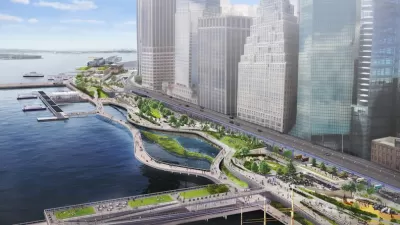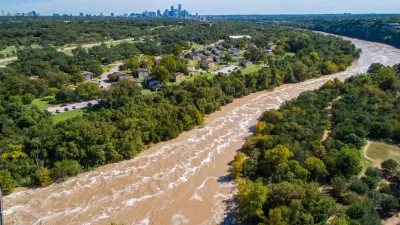The public sector and the private sector need a better system of incentives to deliver on the infrastructure and development investments necessary to prepare for climate change and other environmental threats.

"Many cities are turning to other partners to work on their resiliency efforts," according to an article by Jackie Snow. Other partners, that is, meaning the private sector.
However, much of the article focuses on the remaining disconnect between the public sector and the private sector on the work remaining to be done to build resilience—not just resilience plans. Ernst & Young and 100RC released a study called "How can cities build resilience thinking into their infrastructure projects?" for instance, "found that city governments think they understand the challenges of urban resilience better than they actually do, with only 30% of private sector agreeing that cities understand the work around urban resiliency."
The disconnect is perpetuated like challenges like term limits (politicians are interested in wins during their tenure, not in thinking on the timelines of climate change) and project budgets (private sector entities are afraid of overbidding on requests for proposals. In fact, the "study found that both the public and private sector agree there is insufficient incentives to incorporate resilience thinking into infrastructure," according to Snow.
FULL STORY: The role of P3s in resilience planning

Planetizen Federal Action Tracker
A weekly monitor of how Trump’s orders and actions are impacting planners and planning in America.

San Francisco's School District Spent $105M To Build Affordable Housing for Teachers — And That's Just the Beginning
SFUSD joins a growing list of school districts using their land holdings to address housing affordability challenges faced by their own employees.

The Tiny, Adorable $7,000 Car Turning Japan Onto EVs
The single seat Mibot charges from a regular plug as quickly as an iPad, and is about half the price of an average EV.

With Protected Lanes, 460% More People Commute by Bike
For those needing more ammo, more data proving what we already knew is here.

In More Metros Than You’d Think, Suburbs are Now More Expensive Than the City
If you're moving to the burbs to save on square footage, data shows you should think again.

The States Losing Rural Delivery Rooms at an Alarming Pace
In some states, as few as 9% of rural hospitals still deliver babies. As a result, rising pre-term births, no adequate pre-term care and "harrowing" close calls are a growing reality.
Urban Design for Planners 1: Software Tools
This six-course series explores essential urban design concepts using open source software and equips planners with the tools they need to participate fully in the urban design process.
Planning for Universal Design
Learn the tools for implementing Universal Design in planning regulations.
Smith Gee Studio
City of Charlotte
City of Camden Redevelopment Agency
City of Astoria
Transportation Research & Education Center (TREC) at Portland State University
US High Speed Rail Association
City of Camden Redevelopment Agency
Municipality of Princeton (NJ)





























